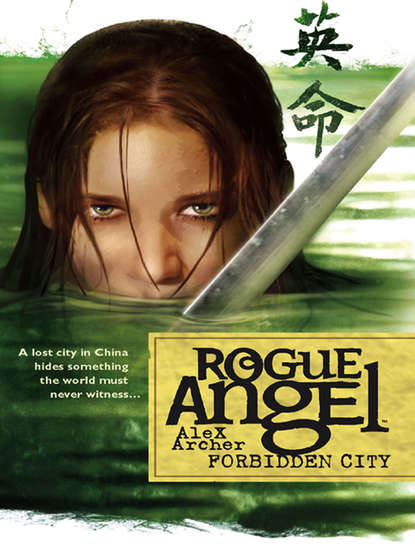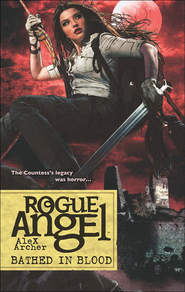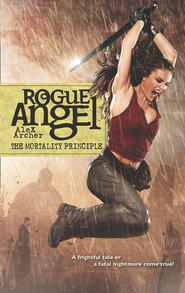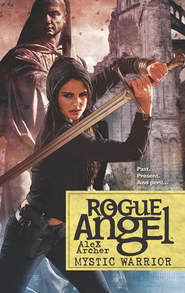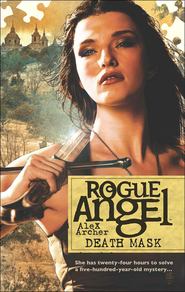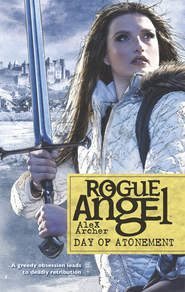По всем вопросам обращайтесь на: info@litportal.ru
(©) 2003-2025.
✖
Forbidden City
Автор
Год написания книги
2019
Настройки чтения
Размер шрифта
Высота строк
Поля
Zedong grew afraid. The horses ran faster, thundering over the road as fear filled them.
“Help!” Zedong called out. “Help me!”
Inside the carriage, he bounced vigorously, slamming against the walls and the cushioned seats. He fumbled the door open and gazed outside, thinking of trying to climb up to the driver’s seat.
Twenty feet ahead, one of the warriors toppled from his mount with an arrow deep between his shoulder blades. Only then did Zedong see two other riderless horses running after the carriage.
One of the warriors in front of the carriage wheeled his mount around and spurred the animal to speed. “Get back inside the carriage!” the man yelled.
Zedong wanted to retreat to safety, but he wished to know what was happening. Gazing behind the carriage, he spotted a slim rider dressed in black. The rider drew back an arrow and let fly.
The warrior who’d gone to engage the enemy gazed down at the arrow that suddenly jutted from his chest. While he still seemed lost in his astonishment, he slid from the saddle. His right foot didn’t clear the saddle straps and his body was dragged across the broken terrain.
The surviving two warriors approached more carefully, riding low over their horses. They closed on the rider in black.
Ignoring them, the rider urged his mount on. He slid the bow over one shoulder and pushed himself into a crouch on the horse’s bare back, balanced one foot in front of the other.
Before Zedong realized what the rider was doing, he’d vaulted from his mount to the top of the carriage. Zedong screamed shrilly and dodged back inside the carriage. Glancing through the back window, he watched helplessly as the final two riders went down to arrows.
Seconds later, while Zedong quivered in fear, the carriage came to a stop.
The rider was at the side of the carriage. He held a sword in his hand as he opened the door.
“Out,” the rider demanded.
Certain that he’d been held up by one of the many thieves that made travel so dangerous in the area, Zedong obeyed. He tripped on the step and fell to his hands and knees. Before he could stand, a blade was pressed to his throat.
The clouds cleared the face of the full moon in that moment. Surprise filled Zedong when he realized that the thief was a woman. A fox mask covered her facial features.
“Who are you?” Zedong demanded, using the imperious voice that he employed whenever he was on the emperor’s business.
She didn’t answer. The sword never moved.
“I represent the emperor,” Zedong threatened. “Your life is forfeit for killing the imperial guardsmen.”
“One more life,” the fox-faced woman said, “won’t matter, then, will it?”
Zedong had time to think only briefly of the curse the old woman had called down on him. It took a moment more to realize that the woman before him might not have been wearing a mask at all and might have been one of the legendary fox spirit women who drained men of their lives.
His throat was cut before he knew it. Then blackness filled his vision.
1900 A.D .
Huddled beneath a thick wool blanket that stank of wet donkeys, Dr. Heinrich Lehmann, a university professor at Berlin University, cursed in the four languages he knew.
“Steady on, Lehmann,” one of the older men at the dig site advised, shouting to be heard over the roar of the storm. “We’ll be out of this shortly.”
Lehmann ignored the man. He hadn’t cared for any of the men Dr. Hedin had employed for the dig. All of them were coarse and vulgar, nothing like the educated men he’d gone to school with.
The windstorm howled and dirt thudded against his blanket.
“Have you ever seen anything like this before?” Lehmann asked.
“Every now and again,” the man yelled. He was American, thick and swarthy from equatorial digs. He spat on the ground at their feet. “It’s worse in Egypt.”
Long minutes later, the windstorm passed.
Lehmann threw the heavy weight of the blanket off. Dust obscured his spectacles. He removed them and cleaned them with his handkerchief. Tall and lean, he was in his twenties, his body stripped of any spare flesh by hard work. He wore jodhpurs, boots and a khaki shirt that was wet with sweat.
Only a few feet away, Hedin doffed his own blanket and looked around. With his glasses and hair in disarray, coated in dust, the Stockholm professor looked like some kind of rodent burrowing out of the dry lands.
“Look!” Hedin pointed.
Staring off to the left where the professor was pointing, Lehmann was amazed. Where piles of loose earth had been, the broken remnants of a city stabbed up at the dusty sky.
“I knew it was here.” Hedin’s voice barely contained the excitement that filled him.
Lehmann couldn’t believe it. Even though Hedin had already achieved several finds in China, in fact had been one of the few Western archaeologists to be allowed into the area, Lehmann had begun to think that Loulan City was nothing more than a fictional reference.
But that would have meant the gold was fictional as well. Lehmann couldn’t accept that. He knew about the City of Thieves. Hedin didn’t. The Swedish professor had been assigned to map out Asia and to trace the history of the Silk Road, the trade route used for centuries to ferry silk out of China and import Western goods.
“I see it, Dr. Hedin.” Lehmann smiled in acknowledgement. The Stockholm professor was only in his midthirties, not much older than Lehmann.
Gazing into the sky, Hedin shook his head. “We need to move quickly. In case Mother Nature decides to take back what she’s so freely given.”
Lehmann reached for his pack and shovel. Dust and grit rubbed his skin under his clothes, promising yet another uncomfortable day. He pushed the discomfort from his mind, remembering only the legend of the gold and the fox spirit that had stolen the emperor’s gold nearly two thousand years before.
1
“Do you do this often, Miss Creed?”
Taking her eyes from the thick expanse of the Eldorado National Forest ahead of her, Annja Creed glanced at her hiking companion. “Not often,” she admitted. “Generally only when someone has piqued my curiosity.”
“And I have done that?”
Annja Creed smiled. “You have.” She’d only known the man for a handful of hours. They’d met briefly in nearby Georgetown, California, to arrange for the hiking trip. Before that they’d had conversations online for almost three weeks.
Genealogy wasn’t Annja’s field of study. When Huangfu Cao had first approached her about trying to find the final resting place of his ancestor, Annja had decided to turn the man down. As a result of the cable network show she co-hosted, she often received cards, letters, and e-mail requests to help strangers track down family legends. The death of Huangfu’s ancestor—though a brutal and interesting story—was too recent to warrant her attention or expertise.
At least, that was what she’d thought until Huangfu had sent descriptions of that ancestor’s prized possessions. One of them had caught her eye enough to draw her to California on a cold day in March to go traipsing down old roads that had once led to gold mining towns long gone bust.
Huangfu Cao looked like he was in his early thirties, but Annja didn’t bother to guess. She was wrong more often than not. He was five feet ten inches tall, matching Annja in height. But he was thin and angular, contrasting with her full-figured curves. His khaki pants held crisp creases. He wore a dark blue poly-fill jacket against the wind and dark sunglasses to offset the bright afternoon sunlight.
Dressed in a favorite pair of faded Levis tucked into calf-high hiking boots and a black long-sleeved knit shirt under a fleece-lined corduroy jacket, Annja was comfortable in spite of the March chill that hung in the afternoon air. She wore her chestnut-colored hair under a baby blue North Carolina Tar Heels cap she’d fallen in love with at one of the airports she’d passed through in her recent travels. Blue-tinted aviator sunglasses took the glare out of the day. Her aluminum frame backpack carried numerous supplies, as well as her notebook computer, but it was well-balanced and she hardly noticed the weight.
“I’m glad you were interested,” Huangfu said.
“Let’s just hope we get lucky,” Annja said as she scanned the forest before her, barely able to make out the old mining trail they followed.





